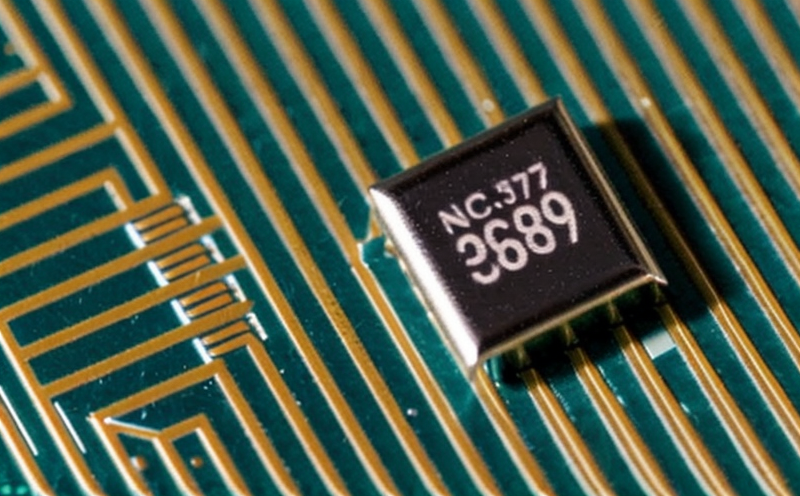JEDEC JESD22-A152 Microchip Energy Dissipation Reliability Testing
The JEDEC JESD22-A152 standard is designed to evaluate the reliability and durability of microchips under conditions that simulate real-world energy dissipation. This test assesses how microchips perform when subjected to high power densities, ensuring they can withstand the heat generated during operation without degradation or failure.
Energy dissipation in microchips can lead to thermal stress, which may cause physical damage and functional failures over time. JEDEC JESD22-A152 addresses this issue by simulating the conditions that generate significant amounts of heat within a controlled environment. The test involves subjecting the microchip to predetermined power levels for specified durations, followed by an evaluation of its electrical performance and structural integrity.
The test setup typically includes specialized thermal chambers capable of delivering precise temperature profiles. These chambers are equipped with high-precision sensors to monitor temperature changes accurately. The specimen preparation process ensures that the microchips are correctly oriented within the chamber to allow for uniform heat distribution.
Instrumentation plays a crucial role in this testing procedure, including data acquisition systems and thermal cameras capable of capturing real-time images of temperature distributions across the chip surface. These tools provide valuable insights into how different areas of the microchip respond to energy dissipation. The test results are analyzed based on criteria outlined in the JEDEC standard, focusing on both electrical performance metrics (such as resistance changes) and physical integrity checks.
The significance of this testing cannot be overstated, especially for industries reliant upon high-performance electronic components. By adhering to the stringent requirements set forth by JESD22-A152, manufacturers can ensure their products meet rigorous quality standards before reaching market. This not only enhances product longevity but also builds consumer trust in brand reliability.
In summary, JEDEC JESD22-A152 is essential for any organization involved in semiconductor manufacturing or related fields seeking to validate the robustness of their microchips against thermal stresses encountered during use.
Why It Matters
The reliability and longevity of electronic components are critical factors influencing product performance and customer satisfaction. Microchips, being integral parts of various devices from smartphones to industrial machinery, must endure continuous operation without compromising their functionality or integrity.
- Ensures Longevity: By simulating the conditions under which microchips generate significant amounts of heat, this test helps identify potential weaknesses that could lead to premature failure. Identifying these issues early allows manufacturers to implement corrective measures before products reach end-users.
- Promotes Safety: Ensuring that components do not overheat prevents accidents and hazards associated with malfunctioning electronics. This contributes significantly to overall safety standards in industries ranging from automotive to consumer goods.
- Enhances Reputation: Consistent adherence to industry best practices like JESD22-A152 reflects positively on a company's reputation, signaling commitment to excellence and innovation within the sector.
In essence, investing in robust testing processes such as JEDEC JESD22-A152 is not just about compliance; it's an investment in future success by guaranteeing product quality and safety.
Why Choose This Test
- Precise Control: The ability to control the power levels and durations allows for detailed analysis of how microchips respond under specific conditions, providing valuable data for optimization efforts.
- Comprehensive Evaluation: This test evaluates both electrical performance and physical integrity, offering a holistic view of component reliability.
- Industry Standards Compliance: Adherence to internationally recognized standards like JESD22-A152 ensures consistency with global best practices and fosters trust among stakeholders.
The comprehensive nature of JEDEC JESD22-A152 makes it an indispensable tool for quality assurance teams looking to enhance product reliability. The precision and thoroughness of this testing method make it suitable not only for initial development stages but also for ongoing quality control processes throughout production cycles.
Customer Impact and Satisfaction
The implementation of JEDEC JESD22-A152 contributes directly to enhanced customer satisfaction by ensuring that microchips perform reliably over extended periods. When customers receive products built using this rigorous testing protocol, they can expect consistent performance and minimal maintenance requirements. This translates into greater trust in brand reliability and long-term value propositions.
Moreover, the proactive identification of potential issues through such thorough testing allows manufacturers to address these challenges before they impact end-users. This approach not only improves customer experience but also reduces warranty claims and associated costs.
- Better Customer Trust: By demonstrating commitment to high-quality standards, companies can build stronger relationships with their customers.
- Increased Market Share: Meeting or exceeding industry expectations increases competitive advantage in the marketplace.
In conclusion, investing in JEDEC JESD22-A152 testing is an effective strategy for enhancing customer satisfaction and maintaining a strong market position.





